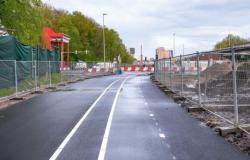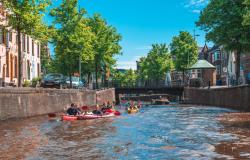“It is so dark here at night that special wild lighting has been installed,” says Piet Roelofs. A cycle path, a 60-kilometre road, another cycle path: nothing more separates his yard from where China Palace now stands and possibly a McDrive later. Behind the prime location in Rheden in Gelderland that McDonald’s has eyed, the Veluwezoom National Park slopes towards the Posbank.
Badger passages have been constructed next to his yard, says Roelofs, and there are deer in his garden regularly. ‘It’s dead quiet at 9 p.m. At the request of the municipality, I then turn off the garden lighting for the bats. Will a McDonald’s be allowed to open here until late at night? Then I can literally hear the orders at the McDrive.’
Since coming to the Netherlands in 1971, McDonald’s has conquered city centers, industrial estates and highway exits. This type of location is now amply provided for. That is why the urge to expand takes the chain to new regions. Put all 263 McDonald’s branches on the map, and not a single yellow M will appear between Arnhem, Zutphen, Enschede, Winterswijk and Doetinchem.
The chain uses a ‘blank spot plan’ for new locations. ‘Ideally we are on a busy main road. We will then also look at other types of locations,” says Jos van Kempen, director of McDonald’s Netherlands responsible for location policy. See the potential in the East here. ‘There is a market there that we are not currently serving.’
Big Mac containers
Not only in Rheden, but also in Warken, a hamlet near Zutphen, and in Haaksbergen, McDonald’s has plans for dilapidated catering establishments along N-roads. A mirror of the times: in Haaksbergen the Danspaleis discotheque has already been demolished, and in Warken schnitzel restaurant ‘t Ooievaarsnest has to make way.
There are also major concerns there. “We don’t want that huge spot of light here in the evening,” says Cyp Wagenaar, as he complains with neighbors at the long dining table. His farmhouse is located on the 80-kilometer road where the McDonald’s should be located on the other side. Surrounding it are meadows surrounded by hedgerows and here and there a farm or house. “It will be very busy, a hangout place,” Wagenaar fears.
McDonald’s expects around a thousand traffic movements in Warken at the weekend, four hundred during the week, according to submitted nitrogen calculations. They all have to turn onto a N-road. ‘Strongs of schoolchildren going to and from Zutphen, a big tractor with a manure tank behind it and then all those cars. You can wait for things to go wrong,” says Wagenaar.
The chairman of the village council has another concern. Schnitzel restaurant ‘t Ooievaarsnest connects the 250 residents of the hamlet. For example, the restaurant provides catering for the summer barbecue and other parties of the Oranje- or Schuttersvereniging. ‘That’s not possible with McDonald’s. And they don’t serve beer either.’
And what about the litter? Wagenaar expects the McFlurry and Big Mac containers to be empty right at the height of his garden, and then they end up in his borders through the open car window.
In Rheden, nature lovers also fear this. An anti-petition has now been signed 15 thousand times. “We are spending millions to protect this Natura 2000 area,” says Dienke Geurtz of the South-East Veluwezoom Tourist Platform. “Then we’ll ruin it again with all that waste.”
The ‘impact director’
There is not only resistance in the east of the country. Although the youth responded enthusiastically when it was announced that Goeree-Overflakkee would finally get a McDonald’s, local residents in Oude-Tonge were less pleased. One of them previously lived near a McDrive, she said A.D. ‘It looked like Italy when there was a garbage collection strike.’
In the sustainable Oosterwold neighborhood in Almere, 11-year-old Maeve opposes the arrival of McDonald’s for the same reason. ‘No Mac in this place’, was also heard recently in the town hall of Deurne in North Brabant. Residents fear traffic nuisance.
In March, McDonald’s opened its newest Dutch branch, in the city center of Deventer. It is telling: while the opening of a branch was often celebrated as a memorable event in the past, summary proceedings were now filed simultaneously. Local residents had initiated this (unsuccessfully) for fear of odor nuisance.
It rarely gets that high. “But we know that local residents are making their voices heard more these days,” says Dolly van den Akker. She is impact director from McDonald’s Netherlands. A new feature that has existed in all McDonald’s countries since last year. ‘As a market leader, we want to have a positive impact on the planet and our immediate environment.’
This includes concessions. The branch in Deventer closes at 10 p.m., has no terrace ‘and the most ingenious odor extraction system’. During the conversation at the head office in Utrecht, she will repeatedly say: ‘We do much more than many people know.’
Imaging
The image is different. Resistance is also more visible, partly due to social media, thinks McDonald’s board member Van Kempen. ‘I often miss the nuance.’
There is a snack bar and an ice cream parlor opposite the branch in Deventer, he says. ‘We are being addressed considerably more critically. While around the corner they are open until 1am.’ Van den Akker: ‘People often think: there you have McDonald’s, that large multinational.’
It bothers Van Kempen that opponents too often do not have the facts in order. There will be considerably more traffic turning than at the Chinese restaurant in Rheden and the schnitzel paradise in Warken, he acknowledges. But two thousand traffic movements per weekend, which critics in Rheden are concerned about? Then national visitor figures were calculated very creatively, he says. McDonald’s expects a maximum of three thousand per week.
McDonald’s, says Van den Akker, relies on ‘impulse visitors’. According to her, guests rarely detour for a Happy Meal, they pass by on the way. ‘That’s why we don’t add much extra traffic.’
As if deploying a secret weapon, Van Kempen shows the sketches of the branch that is to be built at the foot of the Posbank: it will be the first McDonald’s in the Netherlands with a thatched roof. A hedge must shield the Veluwezoom from headlights. ‘We also understand that we have to build something that suits the environment. There will be no such high mast here with a yellow M.’
Permits
And every restaurant has an employee to collect litter, Van den Akker counters another point of criticism. ‘Many franchisees give local residents their private numbers.’ According to our own figures, 95 percent of the packaging material is returned. That must be 100 percent. There is no answer to the question of how many kilotons of waste disappear. “We are also dependent on guests,” says Van den Akker. “Even if there is a trash can, sometimes they throw something out the window.”
Criticism may be diverse and have a lot of resonance, “we also have a lot of fans,” she emphasizes. On average, every Dutch person visits a McDonald’s restaurant every quarter. There is still room for improvement: the goal is to open three to five new branches every year.
Preference is given to locations that already have a catering destination, such as the schnitzel restaurant and the Chinese. This saves a lot of time in the licensing process. Moreover, local politics can hardly get in the way.
McDonald’s ‘always engages in dialogue’, says Van den Akker. To her regret, local residents in Rheden are not yet open to an information evening to hear concerns and correct misunderstandings. That said: Van Kempen knows of only one example of an intended branch that did not materialize after resistance. Should you forego a McDrive in Rheden then, to accommodate local politics and local residents? A long silence follows.

Youth health
Municipal councils would like to have more say in the location of fast food restaurants. But the influence of local government is extremely limited, says councilor Erik de Groot (PvdA) in the Harlingen town hall. In the Frisian town, investment company EG Group wants to open a Burger King along the N-road towards the port, where the ferries to Vlieland and Terschelling depart.
De Groot is about both spatial planning and health. ‘That combination is very uncomfortable in this file.’ There is room for ‘catering’ in the zoning plan for the intended location. “On spatial grounds – smell, noise, traffic – we probably can’t say ‘no’ to Burger King.”
The right to freedom of establishment can hardly be tampered with. But if De Groot puts on his health hat, ‘then things become very difficult’. Harlingen has a relatively large number of residents who are overweight. The municipality has been actively pursuing a policy in the context of Young People at a Healthy Weight since 2014. That is why the municipality previously introduced a general local ordinance to combat mobile snack carts that parked near schools during breaks.
Last year, the city council unanimously adopted the new health policy. “Exercise gardens, healthy football canteens, drinking water at school: we have been working on it for years,” says De Groot. That is also the task of the municipality according to the Public Health Act.
Not that De Groot is against fast food in principle. But at this location: a stone’s throw from the Maritime Academy. A boarding school with a healthy canteen. ‘Then it becomes very tempting to cross the road for a burger.’ The GGD, local general practitioners and schools in Harlingen are also against. ‘It cannot be the case that the benefits are for the market and the costs for society,’ says De Groot.
Paternalism
A councilor who prescribes the diet? Paternalism was also the accusation when seat belts were made mandatory, he counters. ‘It is not new that the government interferes in people’s lives. Although you will never win the popularity prize with that.’

Fast food chains now know perfectly well where their customers live. Research by the demographic institute Nidi shows that residents in socio-economically weaker neighborhoods have approximately seven times as many fast-food restaurants within 1 kilometer of their home – and are more likely to be overweight. When asked, the councilor points out the Harlingen neighborhoods where relatively many people with a lower income and lower education level live: the proposed Burger King location is in the middle of them. Investment company and Burger King operator EG Group does not answer questions about its location policy.
In 2021, researchers already concluded that municipalities have few instruments to ensure a ‘healthy food environment’. The new environmental law makes more possible, although it remains legally complex. De Groot: ‘And before it has an effect, it will take years.’
Guidance
McDonald’s strongly denies that its location policy is geared to the socio-economically disadvantaged. “We come from customers from all social classes, especially many families,” says Dolly van den Akker. ‘A menu costs an average of 10 to 12 euros. Minimum wage cannot afford that.’
She believes that the focus is very much on their sector. ‘Only 4 percent of what ends up in the stomach is bought in fast food restaurants.’ A sausage roll is not essentially different from a burger, she believes.
In the field of health, the company says it ‘takes responsibility’. There are more and more vegetarian alternatives on the menu (although they are not sold nearly as often as the Big Mac). The sugar, salt and fat content of products is reduced (‘while retaining taste’). And through ‘nudging‘ McDonald’s is trying to tempt customers to make healthier choices. Spa Blauw is now the standard option in the Happy Meal, and fruit and vegetables have been added.
‘But we will never do it right for everyone,’ says Van den Akker. Despite all its sustainable ambitions, McDonald’s, as one of the largest meat sellers in the world, has a huge impact on the climate, she acknowledges. ‘We will always remain a burger restaurant.’
Then the question again: no McDrive in the rural areas of Rheden and Warken, as the ultimate compensation for the environment? Board member Van Kempen: ‘I don’t think we will abandon that.’
Tags: Mac place fast food resistance spreading Netherlands
-








